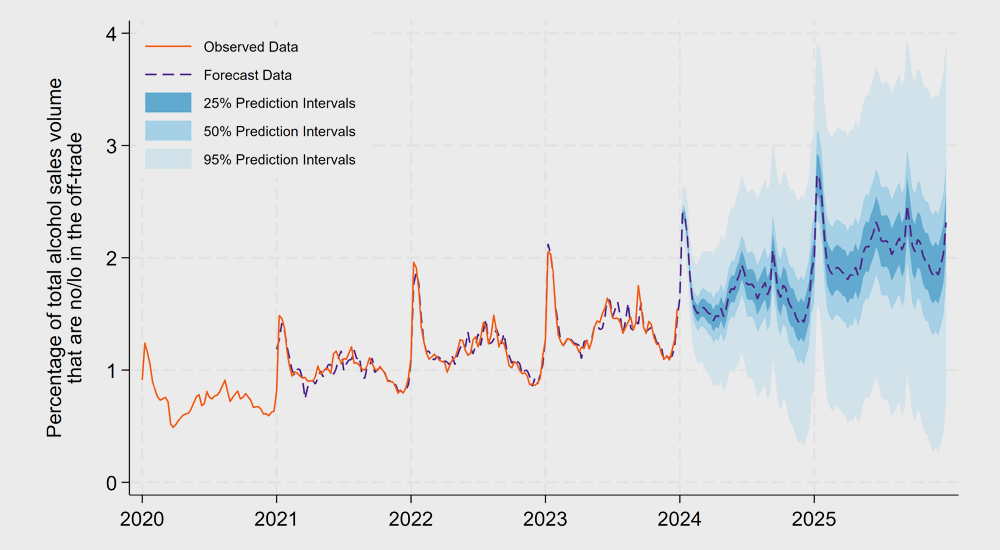SARG team to present at UK Society for Behavioural Medicine Annual Scientific Meeting

Luke Wilson, Anna Butters and Maddy Henney will present on no- and low-alcohol drinks, Dry January and food insecurity.
UKSBM 2024 takes place in Glasgow on 13th and 14th March 2024 and aims to showcase the best of the UK's research into behavioural medicine.
The Sheffield Addictions Research Group (SARG) is well represented with three spots in the programme:
Luke Wilson: Current and future trends in the consumption, sales and purchasing of no- and low-alcohol products in Great Britain between 2014 and 2023
Luke will talk about research carried out as part of an NIHR-funded project examining the potential impact of no- and low-alcohol (no/lo) drinks on public health in Britain.
The research shows that sales of no/lo drinks have been increasing and are projected to continue to grow steadily in both the on- and off-trade. It also predicts a growth in the number of people using no/lo drinks in their attempts to moderate their alcohol intake.
The presentation will look in detail at data sources and analysis methods, key figures and estimates for future sales and consumption trends.
Anna Butters: Understanding reductions in alcohol consumption following participation in Dry January
Anna will present findings from her PhD research which is investigating the long-term effects of Dry January on alcohol consumption.
Her research has found that people who participate in Dry January, especially those who register for the official campaign, are found to drink less six months later.
The research also looks at what factors might help people maintain this change – she found that believing in your ability to resist drinks (drink refusal self-efficacy), feeling less like a "drinker" in general, and being motivated to change are all linked to alterations in alcohol consumption after Dry January.
Maddy Henney: A conceptual model of food insecurity interventions
Maddy will present a poster on her work developing a conceptual model for assessing the effectiveness of different interventions that aim to reduce food insecurity.
The model considers various factors that might influence someone's decision to use a food insecurity intervention such as a food bank or social eating space, like how easy it is to get to or if people feel comfortable using it.
The model is the first step towards building a mathematical tool that can estimate the impact and effectiveness of different food insecurity interventions.
-
SARG researchers to showcase local health modelling at the Prevention Research Conference 2026
Researchers from the Sheffield Addictions Research Group (SARG) will present work from the Local Health and Global Profits programme at the Prevention Research Conference 2026 in Birmingham on 4-5 March.
-
New research shows that spending less on tobacco, gambling and sweets is good for the UK economy
A new study from the Sheffield Addictions Research Group (SARG) has found that public health policies which reduce spending on harmful products can actually provide a significant boost to UK jobs and the wider economy.
-
SARG researcher Dr Parvati Perman-Howe secures NIHR Career Development Award
We are delighted to announce that Dr Parvati Perman-Howe, a Research Associate within the Sheffield Addictions Research Group (SARG), has secured a highly sought-after Career Development Award.
-
Professor John Holmes contributes to major new report outlining actions to tackle alcohol harm
SARG Director Professor John Holmes was part of an expert panel that supported the development of 'A Healthier Future: A long-term vision to tackle alcohol harm in the UK', a significant new report published by the Institute of Alcohol Studies (IAS) this week.
You might also be interested in…
-
SARG researcher Dr Parvati Perman-Howe secures NIHR Career Development Award
We are delighted to announce that Dr Parvati Perman-Howe, a Research Associate within the Sheffield Addictions Research Group (SARG), has secured a highly sought-after Career Development Award.
-
SARG to present latest research on alcohol-free and low-alcohol drinks at SSA Annual Conference 2025
Researchers from the Sheffield Addictions Research Group (SARG) are set to present their latest findings on alcohol-free and low-alcohol drinks at the Society for the Study of Addiction (SSA) Annual Conference 2025.
-
New report reveals further growth and key trends in alcohol-free and low-alcohol drinks market
A second Monitoring Report from the Sheffield Addictions Research Group has been published, revealing further growth in the alcohol-free and low-alcohol (no/lo) drinks market and offering new insights into consumer behaviour and pricing.
